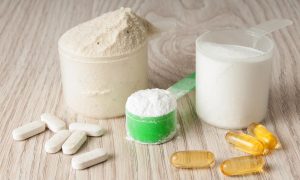Five Common BCAA Supplement Mistakes to Avoid Making

|
|
For bodybuilders, other than good ole whey protein and creatine, there really is nothing more beneficial in terms of muscle growth and repair, than BCAAs. BCAAs, or Branch Chain Amino Acids, consist of three amino acids: Leucine, Valine, and Isoleucine, and get their name because their chemical structure resembles a tree branch. For bodybuilders, next to a solid training routine and balanced diet, supplements can be worth their weight in gold when used correctly, as they have been proven to yield such impressive results, if used correctly. Whilst there really are no substitutions for good food and smart training, if used alongside these components, supplements really can give you that much-needed competitive edge, and can help you push yourself that little bit harder in the gym, and to repair and recover that little bit easier and more efficiently in the process. There are many bodybuilders out there that swear by BCAAs, and other amino acids in general, yet there are a select few that many find themselves struggling to see the appeal. If you’ve been underwhelmed with BCAA supplements in the past, there is a good chance that you were simply not using them correctly. Here are five common BCAA supplement mistakes to avoid making.
Cutting back on protein intakes

Yes, whilst it is indeed true that too much protein, like anything, can be bad for you if you consume too much, when using a BCAA supplement, there really is no reason to cut back on your protein intakes. Ideally you should aim for around 1.5g – 2g of protein per pound of bodyweight if you’re looking to build and retain muscle, but please do not think that a BCAA supplement will provide sufficient amounts of protein. Yes amino acids are the building blocks of protein molecules, and yes they do contain small quantities of protein, but certainly not enough to meet your daily macro requirements. The thing to remember is that whole protein sources are enriched with other amino acids, and as there are more than 20, many of which are essential as the body cannot produce them itself, by cutting back on protein, you deprive your body of amino acids. Put simply, when you take BCAA supplements, there really is no need to cut back on your daily protein intakes.
Taking them at the wrong time
To get the most out of your BCAA supplements, you should make sure that you consume them at the correct time. The same can be said for virtually all other supplements as we need to ensure we are taking them at the right time to really get the most out of them. On training days, as BCAAs promote protein synthesis, they ideally should be consumed before, during, and after a workout, which is why people often begin sipping on them before they train, and finish drinking them once their workout is complete. A lot of people make the mistake of simply drinking them at the wrong time of day, as they believe that as long as they get them in, it doesn’t matter what time they take them. Timing is everything when it comes to BCAAs, so make sure you take them at the right time.
Focussing on Leucine
In terms of protein synthesis for muscle growth and recovery, it is often leucine that gets much of the credit out of the three BCAAs. Whilst it is true that leucine has been proven to be the most anabolic in terms of stimulating protein synthesis, like most other supplements, it only works at its best when it works in synergy with other amino acids, which in this case are isoleucine and valine. A lot of people will read a study talking about the anabolic effects of leucine, and will simply focus on leucine supplements instead, and will basically ditch BCAAs in favour of this lone amino acid. By ditching the other BCAAs, not only will the leucine not work as effectively, but you will also no longer get the benefits from the other amino acids.
Ditching BCAA supplements in favour of others

Nowadays, when you see other proven bodybuilding supplements such as creatine, pre-workouts, and proteins, you may see that they now have been enriched with BCAAs. The reason why BCAAs are added to these supplements is because not only are BCAAs very beneficial, but it also looks more impressive on the labels. A lot of people will use other supplements containing BCAAs, and will think that they are getting enough of these amino acids, so will basically drop BCAAs. In actual fact, when isolated away from other amino acids, BCAAs are at their most impressive, which is why it is always best to use a lone BCAA supplement. If you are using a whey that contains BCAAs, not only will other amino acids be present, but the BCAA quantities will probably be far too small to be of any real benefit anyways.
Not putting in the work
BCAAs, and every other supplement in the world for that matter, will only prove useful if used correctly. To use them correctly, not only should you take them at the right time, in the right dosages, but you should also put in the work. You are using them for health and fitness purposes, and as a result, to get the most out of them, you must ensure you are working hard in the gym, and eating right. If you expect to simply drink some BCAAs, half-ass your workout, and try to eat semi-clean when you feel like it, you won’t see or feel the benefits, and truthfully you may as well just save your money.














